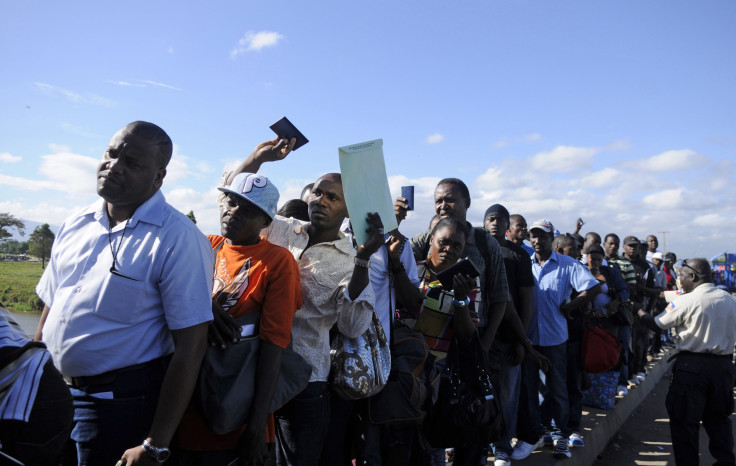
The Constitutional Court of the Dominican Republic handed down a landmark ruling on Wednesday which denies the Dominican nationality to children born in the country whose parents are undocumented immigrants who entered the country illegally or are in transit. The ruling deals a stunning blow to the thousands of people of undocumented Haitian parents who live in Dominican territory, increasing more tension between the two nations that coexist in the same tiny Caribbean island.
For those foreigners that are in transit, the ruling stipulates that they can obtain a residency, which would then allow their children, born in the territory, to acquire the nationality through “jus soli” or the right of soil. But for those with an irregular migratory status, in violation of the laws, their children born in the country aren’t entitled to acquire the Dominican nationality, because "it’s legally inadmissible to establish an entitlement from an unlawful de facto situation.”
The ruling by the Constitutional Court is final and gives the electoral commission one year to produce a list of people to be excluded from citizenship. The decision applies to those born after 1929 and it appears to affect even their grandchildren. A U.N.-backed study released this year estimated that there are nearly 210,000 Dominican-born people of Haitian descent and roughly another 34,000 born to parents of another nationality. Although officials promised to create a path to Dominican citizenship, they gave no details about how it would work or who would be covered.
Experts warned Friday that this court ruling could cause a human rights crisis, potentially leaving tens of thousands of people stateless, facing mass deportation and discrimination. Many of those "are now effectively stateless," Wade McMullen, a New York-based attorney at the Robert F. Kennedy Center for Justice & Human Rights said to AP. "We really don't know what's going to happen to those people ... Based on what the Dominican government is saying, these people are not Dominican citizens and will have to leave and effectively go to Haiti, where they are also not citizens. It creates an extremely complicated situation."
The majority of them don't have Haitian citizenship, have little or no ties to Haiti and likely don't speak Creole, he said. Getting Haitian citizenship can be complicated too because it is difficult to comply with requirements to prove descent from a Haitian national. The Dominican government is currently analyzing the birth certificates of more than 16,000 people, while electoral authorities have refused to issue identity documents to 40,000 people of Haitian descent.
"To all of a sudden be told no, you're not Dominican, it's very frustrating," said Elmo Bida Joseph, a 21-year-old student who said he was denied his ID and a copy of his birth certificate because he was born to Haitian migrants. "All my dreams have been broken," said Bida, a baseball player who needed those documents to enroll in a baseball academy. Now he worries he'll be deported. "I feel that's around the corner. That in any moment I'll be detained and they'll send me to Haiti," he said.
"This ruling cuts against the rights of thousands of people born in the Dominican Republic, and could immediately undermine their access to education and health services," Reed Brody, counsel and spokesman for Human Rights Watch, said in a statement. "It's also likely to discourage an entire community from seeking help when they suffer abuses, for fear of authorities learning their status."
Roberto Rosario, president of the electoral commission, insisted that the government is not denying anyone the right to a nationality, saying people would be able "to legalize themselves through the national legalization plan." However, that plan has not yet been created, despite a 2004 immigration law that called for it, and it was not clear who would be covered. Once the plan is created and the electoral commission turns in its list, it will take no more than two years for legalization, said Immigration Director Jose Ricardo Taveras, member of a nationalist party that has long complained about the "Haitianization" of the Dominican Republic. "Far from remaining in limbo like some critics are arguing, (they) will for the first time benefit from a defined status and identity without having to violate the law," he said.
Haitian-American author Edwidge Danticat said it was "appalling" that the Dominican court has "chosen to commemorate the upcoming 76th anniversary of the October 1937 massacre of thousands of Haitians in the Dominican Republic by stripping Dominican-born men, women, and children of Haitian descent of their citizenship, rendering them not only stateless but unable to attend school or make a living while becoming even more vulnerable to all kinds of hostilities including, increasingly, physical violence."
The office of Haitian Prime Minister Laurent Lamothe declined to comment about the ruling. The Dominican government estimates that some 500,000 people born in Haiti live in the Dominican Republic.
© 2025 Latin Times. All rights reserved. Do not reproduce without permission.





